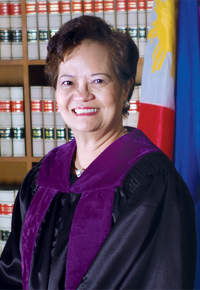News
OSG urged to start quo warranto case vs. de Castro

FILE: A private citizen has asked the Office of the Solicitor General (OSG) to initiate another quo warranto proceedings, this time, challenging the authority of Supreme Court Associate Justice Teresita Leonardo-de Castro to hold her post, over her alleged failure to submit her statement of assets, liabilities and net worth (SALN). (Photo by Supreme Court of the Philippines – http://sc.judiciary.gov.ph/aboutsc/justices/j-decastro.php, Public Domain)
MANILA — A private citizen has asked the Office of the Solicitor General (OSG) to initiate another quo warranto proceedings, this time, challenging the authority of Supreme Court Associate Justice Teresita Leonardo-de Castro to hold her post, over her alleged failure to submit her statement of assets, liabilities and net worth (SALN).
Jocelyn Marie Acosta sent a four-page letter addressed to Solicitor General Jose Calida, seeking to invoke the same grounds raised by Eligio Mallari in his letter as sufficient grounds to file a similar petition for a quo warranto case against De Castro.
“As a citizen of this country and (as) a taxpayer, I humbly request that the Solicitor General urgently initiate quo warranto proceedings against Associate Justice Teresita Leonardo-De Castro for lacking integrity as a member of the Supreme Court,” Acosta said.
De Castro was also a candidate for chief justice, during the time when Sereno was appointed as the country’s top magistrate.
The Judicial and Bar Council (JBC) required all applicants for the chief justice post from the government to submit all their previous SALNs during the application period.
Acosta said it was within the right of the JBC to waive the requirement because “the JBC could do so because of the submission of SALNs is not a constitutional requirement, but a JBC requirement, which the JBC can waive.”
“This waiver benefited both Chief Justice Sereno and Justice de Castro,” she added.
Acosta said JBC records would show that de Castro only submitted her SALNs for 15 years when in fact she has been in government service from 1973 and should have submitted 39 SALNs.
She has been working in government for 40 years, which started in February 1973 when she was law clerk at the Office of the Clerk of Court.
“Justice de Castro appears to have perjured herself before the House of Justice Committee when she openly accused the Chief Justice for not complying with the JBC’s SALN requirement, all the while knowing that the SALN rule was waived by the JBC, from which Justice De Castro herself benefited,” the four-page letter read.
De Castro was among those who appeared before the congressional hearing and volunteered to prove that Sereno’s apparent non-submission of all her SALNs means she should not have been considered for the chief justice post.
Last April 10, the High Court held oral arguments on the quo warranto petition filed by the OSG against Sereno, which sought to nullify her appointment over her alleged non-filing of her SALN.
Sereno faced her probing colleagues at the Supreme Court in Baguio City last April 10, a first in Philippine history.
Sereno was even required by her colleagues to answer their questions under oath.
During the interpellation a heated exchange argument between Sereno and de Castro on the latter’s failure to submit copies of her SALNs which she claimed she had filed.
De Casto even accused Sereno of failing to religiously comply with Section 7 or Republic Act No. 3019 which requires every public officer, within 30 days after assuming office, and within the month of January of every other year thereafter, as well as upon the expiration of his term of office, or upon his resignation or separation from office a true detailed and sworn SALN, including a statement of the amounts and sources of his income, the amounts of his personal and family expenses and the amount of income taxes paid for the next preceding calendar year.
On Thursday, Acting Chief Justice and Senior Associate Justice Antonio Carpio said SC is set to decide on the quo warranto petition filed by the OSG to nullify the appointment of Sereno over her alleged non-filing of SALN in May.
“We hope to finish it by end of month, by next month we should able to decide it,” Carpio told reporters in an interview after the launching of the new app called Justice PH at the Quezon City Hall of Justice on Thursday.
The whole month of May is supposed to be for decision writing by the magistrates. However, the high court has set a special en banc session on May to come up with a ruling on the quo warranto case.





















